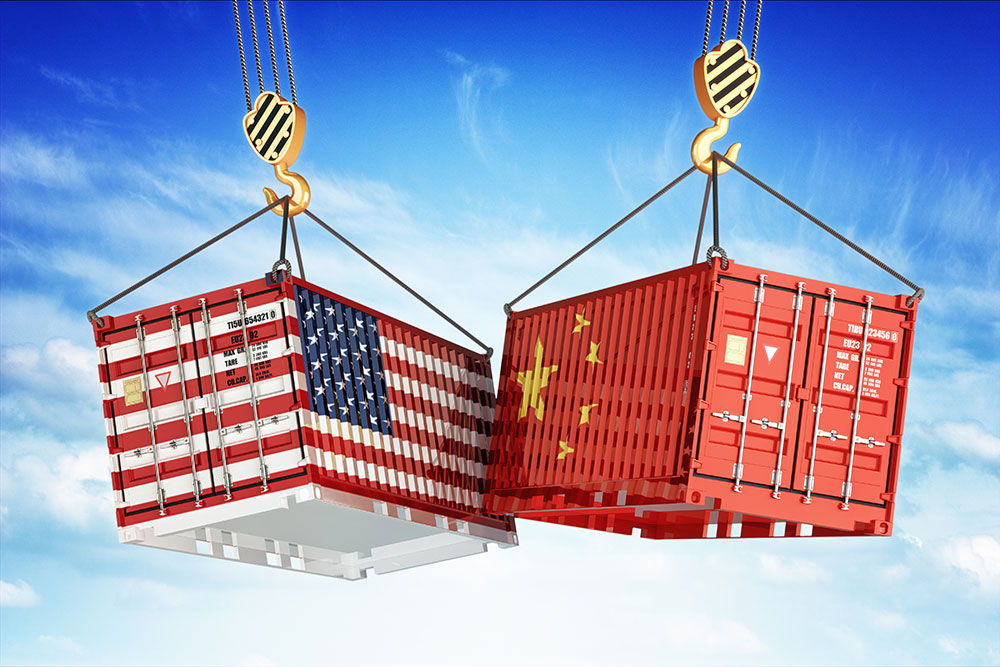
The US trade war with China has forced manufacturers to reevaluate production and operational strategies in an effort to cut costs.
August 15, 2019
By: Pete Zimmerman, VAI
The escalating trade war between the U.S. and China has put American manufacturers in a tough spot.
The U.S.’s imposition of tariffs on China and China’s responses — like slashing agriculture spending in the U.S. — have impacted markets at home and increased the uncertainty of long-term economic forecasts. They’ve also cut revenue projections for many American companies.
Businesses that rely on manufacturers in China and other countries affected by trade tensions are faced with a difficult decision: Should they move some or all of their outsourced operations elsewhere? And while the intent of the tariffs is to bring this work back home to the U.S., that does not appear to be what’s happening. According to a recent survey from the American Chamber of Commerce, 40 percent of manufacturers are in the process of moving, or planning to move, manufacturing operations in China to other countries outside the U.S.
What’s more, analysts have noted that even if a business makes the costly and complex long-term decision to leave China behind, they are struggling to find a new home for their operations. Some emerging economies are only taking business on a “first come, first served” basis, and often lack the capabilities, infrastructure, and workforce that makes China such an attractive location for outsourced manufacturing.
Businesses should be careful before making a drastic and expensive decision like shifting their manufacturing operations in the face of tariffs. Government decisions on trade policy have been difficult to predict, meaning tariffs and heightened tensions could disappear as quickly as they appeared. Instead, businesses with significant manufacturing operations in countries currently affected by tariffs — which also include Mexico, India, and the EU — should explore how technology can ease pressure on revenues by cutting costs.
Making the difficult decision to move operations from countries that have been hit with tariffs may seem inevitable. However, there are many options manufacturers should explore first that may help close some of the revenue gap. Companies should explore how technology can help create efficiencies and reduce costs throughout the supply chain.
If the current trade environment has impacted your business, or if the looming threat of more tariffs has you questioning your long-term manufacturing strategy, here are a few ways technologies might lessen the burden.
Keep resourcing overhead low. Modern software such as enterprise resource planning software (ERP) can greatly reduce the costs of any given manufacturing operation. Implementing a new ERP solution or upgrading existing software can ensure individual plants or factories have the optimal amount of inventory on hand. When operations have the right product, in the right quantity at the right time, the savings can be significant. These systems also offer features like smart suggestions for purchasing, production, warehouse management tools, and direct shipment capabilities to locations outside of the U.S. which increase efficiencies. Also, analytics software can provide valuable insights based on your existing ERP data.
Invest in automation. Examples of automation would be technology such as simple barcode scanning, RF tags and readers, automatic conveyor systems, robotics and Internet of Things (IoT) devices. Automating parts of the manufacturing process is something businesses should be exploring even if a “cease-fire” is called in the trade war. Examine your warehouse, supply chain, and factory floor for processes that can be automated to reduce labor costs. While even a giant like Amazon is still a decade away from a fully automated warehouse operation, the company has worked to automate certain processes that greatly surpass human capabilities in terms of speed and efficiency.
Get machines talking. IoT is more than a buzzword. Businesses that use IoT technology to connect the machines and systems that power their manufacturing operations will find a multitude of opportunities to save. By using sensors to collect real-time information throughout the manufacturing process, operators can monitor the health of individual machine components, predict trouble on the line before it happens, and analyze output and measure product quality. The savings created with additional uptime and better efficiency can help to offset the cost of tariffs and other fallout from trade tensions.
Consider the cloud. The IT expenses of a manufacturing operation can be significant, especially if the organization hosts software and stores data on-premises. Servers are costly and difficult to maintain, and the specialized IT staff needed to keep them running are also expensive — not to mention difficult to hire for. However, by bringing more software and data into the cloud — for example by implementing a cloud-based ERP system — these costs can be reduced or permanently eliminated.
Businesses need to make sure their manufacturing operations don’t become collateral damage in an increasingly ugly trade war. With smart shifts in technology strategy, they can avoid the costly long-term effects of moving their operations elsewhere. After the dust settles from these international trade battles, the companies that have invested in better technology and processes will emerge stronger and even more competitive.

Pete Zimmerman
About the Author
Pete Zimmerman is the North American Sales Manager at VAI, a leading ERP software developer. Pete has worked in software implementation for over 20 years, with a specific focus on providing technology solutions that improve efficiencies in the manufacturing sector. In addition to his wide-ranging knowledge of manufacturing, Zimmerman has significant expertise selling solutions and services across broad IT portfolios and with virtually all types of enterprise software. As an IBM Certified Specialist and manufacturing industry expert, Zimmerman has spoken at numerous conferences and trade shows.
Contact: sales@vai.net, 631-588-9500
Scott Ellyson, CEO of East West Manufacturing, brings decades of global manufacturing and supply chain leadership to the conversation. In this episode, he shares practical insights on scaling operations, navigating complexity, and building resilient manufacturing networks in an increasingly connected world.